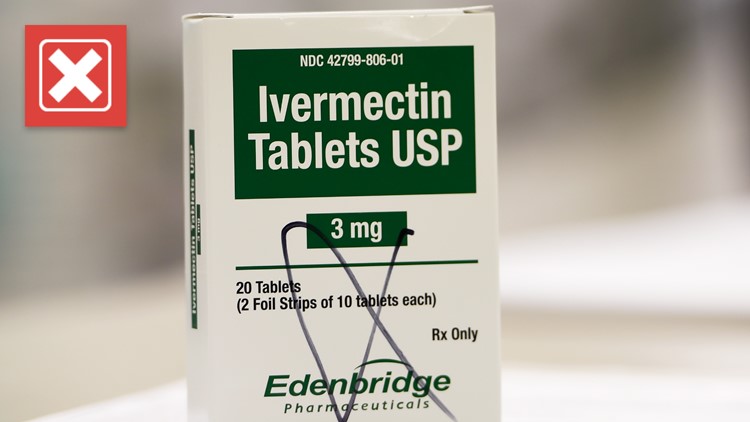Health agencies such as the FDA and private health companies across the world have worked on finding and creating effective treatments since the COVID-19 pandemic erupted in early 2020. The FDA has reviewed hundreds of drugs and researchers have put drugs through thousands of clinical trials to find which drugs might be effective in fighting COVID-19.
During that time, many drugs have looked promising in early trials only to run into issues in later trials. Some drugs have returned mixed results between trials, while other drugs have looked promising in trials with limitations or issues.
That leads to some confusing scenarios in which the public hears of a drug with early promise and then hears the same drug is ineffective just a few months later. These confusing conditions have led to the rise in public popularity for some drugs that regulators aren’t yet comfortable approving and recommending to the public. The most well-known example is hydroxychloroquine, but the most recent example is ivermectin.
Further boosting ivermectin’s popularity is an Instagram video popular podcaster Joe Rogan posted in early September describing his COVID-19 treatment of monoclonal antibodies, ivermectin, Zithromax Z-Pak Oral, prednisone and a vitamin drip.
To help clear up that confusion, the VERIFY team has put together a list of which drugs are actually approved COVID-19 treatments by the FDA and why each drug is or isn't approved.
Most importantly, remember to always consult a doctor before taking any new medication.
THE QUESTION
Is remdesivir FDA-approved for treating COVID-19?
THE SOURCES
THE ANSWER
Yes, remdesivir is the only drug fully approved for use in treating COVID-19 by the FDA. However, the FDA only approved it for hospitalized patients.
WHAT WE FOUND
Remdesivir, an antiviral drug, is the only drug the FDA has given full approval to for the treatment of COVID-19. Even then, the drug is only fully approved in specific settings.
Its usage is for hospitalized patients 12 and older weighing more than 88 pounds — its use in hospitalized patients under 12 is permissible under an Emergency Use Authorization (EUA).
The FDA said it approved remdesivir because hospitalized patients in trials recovered more quickly when remdesivir was administered. The FDA said remdesivir should only be administered in a hospital or similar health care setting.
The Mayo Clinic says remdesivir is administered by a nurse using an IV needle over the course of 30 to 120 minutes. A person on remdesivir is typically given the medicine once a day over five to 10 days.
THE QUESTION
Is ivermectin FDA-approved for treating COVID-19?
THE SOURCES
- Food & Drug Administration (FDA)
- Merck (ivermectin manufacturer)
- Dr. Stuart Ray, infectious disease expert at Johns Hopkins Medicine
THE ANSWER
No. As of Sept. 13, 2021, the FDA has not approved the use of ivermectin for treatment of COVID-19. Clinical trials are still ongoing for the antiparasitic drug.
WHAT WE FOUND
The FDA has not approved or authorized the use of ivermectin in treating COVID-19. Ivermectin’s manufacturer, Merck, made a statement in February affirming it does not yet support the use of its drug in treating COVID-19. The drug’s use in treating COVID-19 is currently being studied, but both the FDA and Merck say the currently available data do not show its effectiveness.
“We have not seen a well performed clinical trial in a large population that shows a benefit of ivermectin for people with COVID, either in prevention or in treatment,” Dr. Stuart Ray, an infectious disease expert with Johns Hopkins Medicine said. “There is data that ivermectin and some other agents may inhibit the virus in a test tube. The problem is that our pharmacologists tell us that the levels needed to achieve that effect in the body would require a toxic dose. And so there are ongoing trials to see whether those predictions of the pharmacologists are incorrect, and that maybe the drug is truly effective.”
The FDA says it’s dangerous to take large doses of ivermectin. An ivermectin overdose can cause symptoms that range from nausea and vomiting to comas and death. That’s one of the major reasons the FDA has made such a strong warning against taking the veterinary form of ivermectin. Many animal ivermectin products come in large doses because they’re for large animals like cows and horses, and generally animal ivermectin products are very different from ivermectin for humans.
That’s why it’s important to always consult a doctor before taking any kind of new drug.
“If your health care provider writes you an ivermectin prescription, fill it through a legitimate source such as a pharmacy, and take it exactly as prescribed,” the FDA says in its ivermectin information page.
THE QUESTION
Is azithromycin (Zithromax Z-Pak Oral) FDA-approved for treating COVID-19?
THE SOURCES
THE ANSWER
No. The FDA has not approved azithromycin for treating COVID-19. It has, however, been approved for treating specific bacterial infections that can occur in COVID-19 patients.
WHAT WE FOUND
Azithromycin is an antibiotic, which means it’s used to fight bacterial infections like pneumonia and lung infections, MedlinePlus says. It has been used to treat bacterial infections in hospitalized COVID-19 patients, and has been studied for its potential in treating COVID-19 when used alone or in combination with other drugs, like hydroxychloroquine.
The FDA has approved the drug’s use in treating bacterial infections. However, the FDA has not approved azithromycin or any other antibiotic for treating COVID-19.
Much like ivermectin, azithromycin showed antiviral potential in test tubes — called in vitro by the NIH. But it did not reduce viral loads or positively alter outcomes for hospitalized patients in clinical trials.
Clinical studies have also found that azithromycin isn’t effective for non-hospitalized patients, such as one released in July by UCSF.
The NIH recommends against the use of azithromycin in treating COVID-19 for both hospitalized and non-hospitalized patients.
THE QUESTION
Are monoclonal antibodies FDA-approved for treating COVID-19?
THE SOURCES
THE ANSWER
Monoclonal antibodies don’t have full approval from the FDA, but there are several Emergency Use Authorizations (EUAs) for their use in treating COVID-19.
WHAT WE FOUND
The FDA has granted three monoclonal antibody treatments Emergency Use Authorizations: REGEN-COV, sotrovimab and a joint administration of bamlanivimab and etesevimab. An EUA is different from full FDA approval and expires after a certain period of time. There are currently 11 drugs with EUAs for treating COVID-19.
Monoclonal antibodies are described by the FDA as “laboratory-made proteins that mimic the immune system’s ability to fight off” viruses. Harvard Health says all three of the FDA-authorized antibody therapies target the coronavirus’s spike protein to make it more difficult for the virus to attach to and enter human cells.
All three are authorized for patients with mild-to-moderate COVID-19 symptoms who are at risk of severe disease or hospitalization.
The antibodies are administered by IV by a medical professional at infusion centers around the country, which can be found online.
THE QUESTION
Are chloroquine drugs, such as hydroxychloroquine, FDA-approved for treating COVID-19?
THE SOURCES
THE ANSWER
No. Hydroxychloroquine and similar drugs like chloroquine phosphate are not FDA-approved for treating COVID-19.
WHAT WE FOUND
While the FDA initially issued an EUA to treat COVID-19 with chloroquine and hydroxychloroquine in early 2020, the FDA revoked that EUA in June 2020. The decision came after clinical trials found the medicines did not reduce the likelihood of death or hospitalization in COVID-19 patients and caused safety issues such as heart rhythm problems.
Hydroxychloroquine and chloroquine are both FDA-approved to treat malaria, and hydroxychloroquine is also FDA-approved to treat autoimmune conditions.
The NIH says the drugs showed in vitro promise but lacked benefit when tested in clinical trials. The NIH recommends against the use of both chloroquine and hydroxychloroquine, alone or with other drugs, for the treatment of COVID-19.
The WHO does not recommend the use of hydroxychloroquine and chloroquine to prevent or treat COVID-19 after clinical trials demonstrated the drugs were not effective for either.
In March 2020, the FDA reported at least one person died after taking chloroquine phosphate intended for treating fish. The FDA warns against using veterinary medicines, as they have not been evaluated for human safety.
THE QUESTION
Has the FDA approved zinc, vitamin C or D, melatonin or any other over-the-counter medication for treating COVID-19?
THE SOURCES
- World Health Organization (WHO)
- National Institute of Health (NIH)
- Harvard Health
- Dr. William Schaffner, infectious disease expert at Vanderbilt University
THE ANSWER
No, the FDA hasn’t approved any dietary supplements or over-the-counter medications for COVID-19 treatment. People with nutritional deficiencies may need to take supplements, but at the direction of a doctor.
WHAT WE FOUND
The NIH’s Office of Dietary Supplements has a list of dietary supplements that have been tested in clinical trials for potential use in COVID-19 treatment. Trials have not indicated any supplement is useful in COVID-19 prevention or treatment thus far.
That doesn’t mean supplements can’t provide benefits that could help a person fight COVID-19.
“Micronutrients, such as vitamins D and C and zinc, are critical for a well-functioning immune system and play a vital role in promoting health and nutritional well-being,” the WHO says on its COVID mythbusters page.
Harvard Health says deficiencies in zinc and vitamin D are not rare, and because of their benefits to immune health it says supplements for those nutrients “may be appropriate for people in whom deficiency is suspected or confirmed.”
But the NIH says intakes of these nutrients above recommended amounts can be toxic. The NIH specifically recommends against zinc intakes above the daily recommended amount to treat COVID-19.
“Do not use home remedies,” Dr. William Schaffner, an infectious disease expert at Vanderbilt University, said. “We all want something that will prevent and will treat COVID successfully and safely. If there were any medicine that were safe and effective, we would all be using it.”
More from VERIFY: No, taking zinc will not protect you from COVID-19



